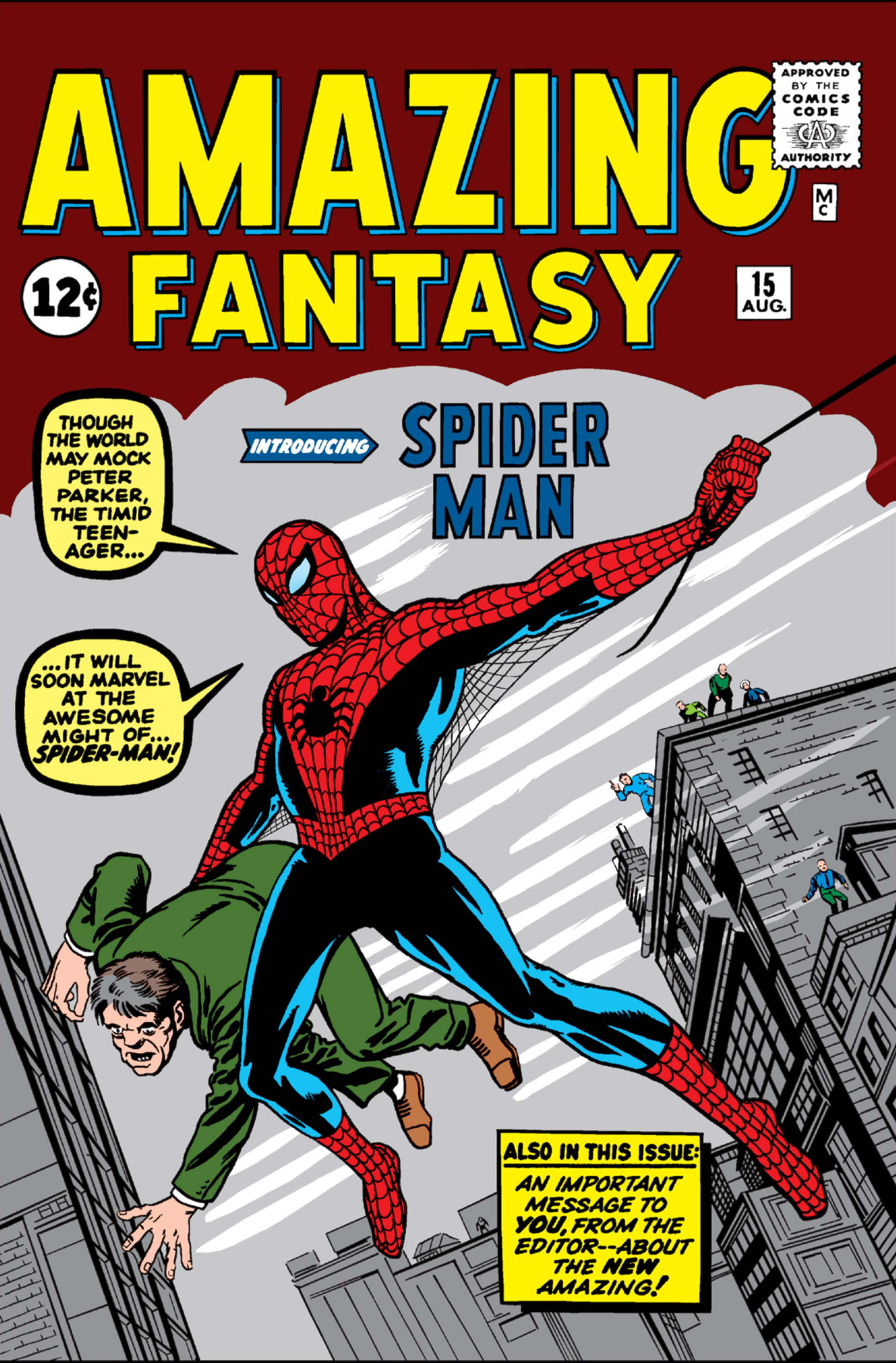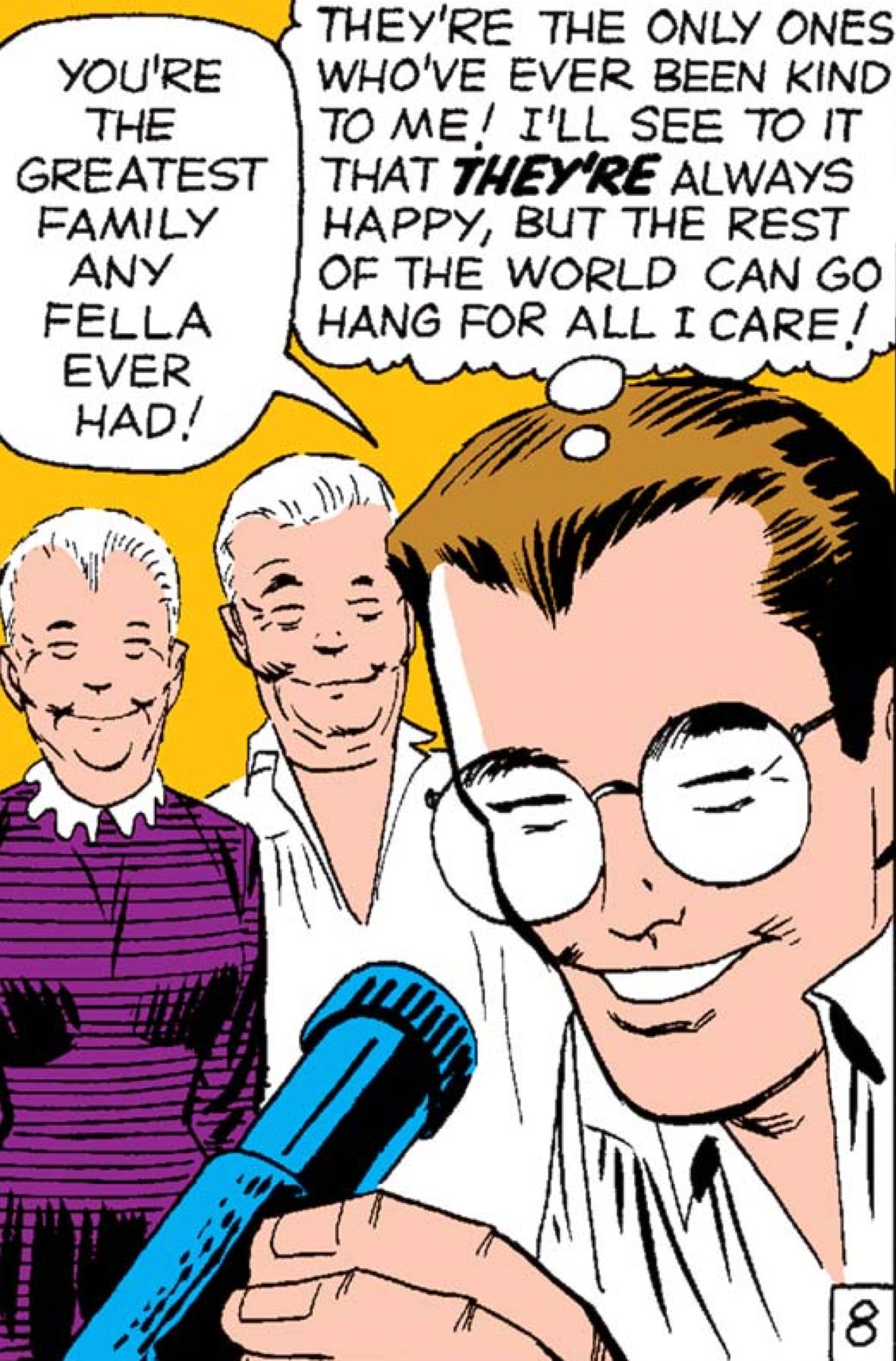Nostalgia only gets you so far. If a character endures for decade after decade and appeals to multiple generations, it’s because fundamental elements resonate with people of all ages and backgrounds. The concept is timeless rather than timely.
Such is the case with Spider-Man and his origin story in Amazing Fantasy #15 by Stan Lee and Steve Ditko.
A kid struggles with growing up, but love ultimately sets him on the proper path. The story was published in 1962, but there’s nothing about that theme that screams “1962!” Sure, the surface-level details are dated, but update those details and then this story can happen in any year. (And it’s taken place in several different years so far.)
There are at least two broad categories of superhero origin stories. In one, the origin is essentially an inciting incident—a super-power delivery mechanism that allows the episodic adventures to begin. Barry Allen gets splashed by electrified chemicals, so he becomes the Flash. A dying alien bequeaths Hal Jordan with a power ring, so he becomes Green Lantern. They receive their powers; therefore, they become superheroes. The only changes are physical. The Fantastic Four are another example—they possess the same adventurous, curious spirit before and after their exposure to cosmic rays. The cosmic rays and resulting powers merely open up whole new avenues of adventure.
But then there are superheroes with full-fledged origin stories. In these, the character not only develops powers but also grows in some way. Tony Stark rebuilds himself into a new man in Iron Man’s first appearance. And Peter Parker does a lot of growing up in Spider-Man’s debut.
The radioactive spider bite is just a plot twist, but there’s a whole origin story on top of that—a complete story in 11 pages, featuring a dynamic character who learns an important lesson … the hard way.
Very little is inevitable in this story, because of an interesting conflict set up within the first couple of pages.
We meet Peter Parker as an awkward teenager existing between two worlds. One is the home world of his childhood, where his kindly aunt and uncle have established a warm, nurturing, loving environment. Outside of that comfortable home life, there’s the larger, wider world where he’ll have to become an adult, where the other kids are mean and harsh to him, where no one appreciates him. The other kids don’t understand Peter, and Peter doesn’t understand them either. He doesn’t understand how the wider world works, and he doesn’t understand how to fit into it.
But he needs to figure out how to integrate into that world or it’s going to destroy him. It’s a classic coming-of-age story.
Only two things, then, are inevitable: Peter will have to join the adult world. And that radioactive spider will bite him. He has very little say on those two matters, but the rest is up to him.
At first, he chooses to dwell on how mean everyone is to him. Instead of focusing on the love he’s already been shown, he focuses on the meanness and harshness, on the worst of people. He lets it make him bitter. And that leaves him sounding like a supervillain in the making.
This doesn’t sound like a guy you’d expect to become Spider-Man. This sounds like a guy you’d expect to fight Spider-Man.
So he gets his powers, and like most people, his first thought isn’t fighting crime. He thinks of his own personal gain, of gaining admiration and validation from that harsh, mean adult world. So he hardly gives it a second thought when he lets a thief run past him, a thief he could have tripped up without much personal risk.
Because of this choice, the harsh outside world invades Peter’s idyllic home world, and the thief he could have stopped kills his uncle. Peter is so focused on getting people to like him that he fails the two people who already loved him unconditionally.
The tragedy snaps sense into him. Peter is still not a hero yet, not at the end of this first story, but the seed has been planted by the very love he was desperately seeking, the love he already had.
Peter fails to save Uncle Ben, but Uncle Ben’s love saves Peter Parker from growing up into a terrible person. If you subtract the love of Uncle Ben and Aunt May, you have no Spider-Man.
Allow me to put on my Rod Serling voice …
With great power, there must come great responsibility, a hard lesson for any youth to learn. Case in point: Peter Parker, age 17, a bitter young man lost in the chasm between childhood and adulthood, between raw potential and refined purpose. Peter Parker has fallen through the abyss and landed … in the Twilight Zone.
Or the Marvel Universe.









I recently also wrote an article about Spider-Man's (Peter Parker) origin story, so it was very cool to read your take on it as well!
(Though mine was much more focused on what “With great power there must also come -- great responsibility!” means, rather than the origin story in general.)
I hadn't thought of it as a coming-of-age story before - but now that you've pointed out how Peter had to learn and figure out what kind of person he wants to be when he grows up, it really clicked with me!
And I love how you pointed out Peter's dwelling on the people who didn't like him instead of the people who love him plays an important part in the story.
Absolutely agree with you that the fundamental core of this story is timeless, which is why it irked me a little when the MCU Spider-Man movies (as much as I love them) chose to just implied that it happened (and inconsistently at that)!
Great write-up! Seeing you write for Spider-Man day also inspired me to write a post for tomorrow after being writer's-blocked all week (though I guess by now it will be a belated Spider-Man day).
I like how you mentioned that pre-responsibility Peter feels more like someone who would fight Spider-Man, and how his change towards responsibility also stems from love. I think sometimes adaptations like to generalize that his motives are caused by guilt, but it would be awfully difficult to continue on the way Spider-Man does as selflessly and for as long as Spider-Man does if it was still only caused by "I should have been there" without the second, stronger motivation of empathy and love's "I want to be there."